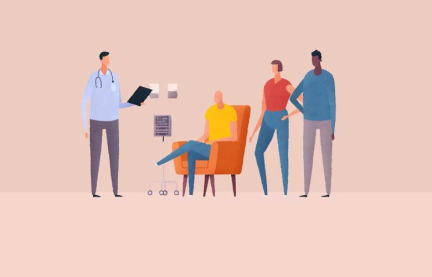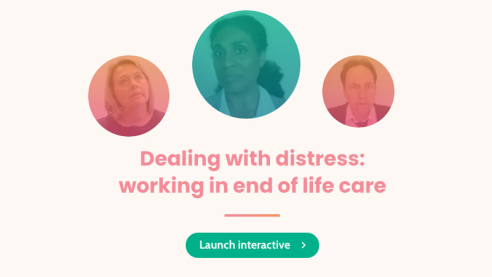We only get one chance to have our dying wishes met, which is why it’s vital to talk, plan and make arrangements for the end of life – before it’s too late. With the sudden Coronavirus pandemic, it seems more crucial than ever to lay out our plans; our immersive interactive 'Life or Death Decisions' explores this further. We also have three free courses on the subject of death, dying and grief, which could prove useful at this time. We also have an article on why death of a loved-one from COVID-19 is particularly difficult to process. Check out the resources below:
-
How COVID-19 challenges our notion of a good death
Read now to access more details of How COVID-19 challenges our notion of a good deathErica Borgstrom, a medical anthropologist and lecturer at The Open University, explores why death from coronavirus is not the type of death we expect.

-
Grief during COVID-19: supporting our colleagues to return to work and thrive following loss
Read now to access more details of Grief during COVID-19: supporting our colleagues to return to work and thrive following lossEven if we have been fortunate enough not to experience loss ourselves during this pandemic, there may be colleagues who have. So, how can we support grieving colleagues during these challenging times?

-
Life or Death Decisions
Take part now to access more details of Life or Death DecisionsEver heard of advance care planning? Setting out what you’d want to happen to you if you became too unwell to make your own decisions doesn’t have to be morbid but can be incredibly helpful and give you peace of mind. Find out more in this interactive video simulation…

-
An introduction to death, dying and grief
Learn more to access more details of An introduction to death, dying and griefExplore interesting and challenging ideas around death, dying and grief. This free course, An introduction to death, dying and grief, invites you to think more deeply about death and dying and encourages you to think about it in different ways. This course will introduce you to different perspectives on death; ethical issues related to dying and...

-
Death and medicine: postponement and promise
Learn more to access more details of Death and medicine: postponement and promiseThis free course, Death and medicine: postponement and promise, helps you to explore the extent to which death and dying in western societies are medical events and what aspects of death and dying might be neglected as a consequence. The course covers the way that such things as medicine provide the context of the experiences associated with the...

Depression is extremely common when it comes to a loved one dying and there's much anxiety around the numbers of deaths due to COVID-19. The two free courses below look at depression and anxiety in more detail, plus we have an article on what to do about your ill mental health if you don't have the support you need.
-
Exploring depression
Learn more to access more details of Exploring depressionThis free advanced level course, Exploring depression, serves as an introduction to masters level study in neurosciences and mental health. Focusing on depression, you will consider key issues concerning diagnosis, causes and interventions. You will also begin to explore theoretical models, biological and psychological explanations, and look at ...

-
Exploring anxiety
Learn more to access more details of Exploring anxietyThis free advanced level course, Exploring anxiety, serves as an introduction to masters level study in neurosciences and mental health. Focusing on anxiety, you will consider key issues concerning diagnosis, causes and interventions. You will also learn how to evaluate news items, and to go behind the headlines and begin to explore some of the ...

-
What can I do about my mental health when I don’t have the support I need?
Read now to access more details of What can I do about my mental health when I don’t have the support I need?What can you do if you're not comfortable talking about mental health issues with your peers? Dr Jonathan Leach and Dr Mathijs Lucassen set out six ways of getting the support you need.

We've also put together this video series on our YouTube channel, exploring different ways of breaking bad news and the impact of how the news is delivered has upon the person hearing it. How do you tell someone that they're dying? And how will they respond to the news?
Did you know death, dying and bereavement has been a major research and teaching theme at the OU for over twenty years? Find out more on our research page.
We have curated a collection of free learning content from OpenLearn to open up the subject. Take a look at the extra resources below.
-
Beyond belief: talking to the dead
Take part now to access more details of Beyond belief: talking to the deadAre paranormal experiences real? Can being 'spiritual' help with the way you feel about death, dying and grief? This film interactive delves into spiritual healing and your views on life after death...

-
Life or Death Decisions
Take part now to access more details of Life or Death DecisionsEver heard of advance care planning? Setting out what you’d want to happen to you if you became too unwell to make your own decisions doesn’t have to be morbid but can be incredibly helpful and give you peace of mind. Find out more in this interactive video simulation…

-
An introduction to death, dying and grief
Learn more to access more details of An introduction to death, dying and griefExplore interesting and challenging ideas around death, dying and grief. This free course, An introduction to death, dying and grief, invites you to think more deeply about death and dying and encourages you to think about it in different ways. This course will introduce you to different perspectives on death; ethical issues related to dying and...

-
Death is inevitable: But do you need to plan for it?
Read now to access more details of Death is inevitable: But do you need to plan for it?For many, this question may at first seem like an odd one. It may be something you have never thought about – thinking about what the end of life may be like. For others, dying may not seem like something you can ‘plan for’, preferring to presume it is down to fate. And you might be wondering why question something you might have very little ...

-
Let’s not talk about dying: Five reasons why people avoid planning for their end-of-life care
Read now to access more details of Let’s not talk about dying: Five reasons why people avoid planning for their end-of-life careMost people haven't heard of advance care plans or may avoid planning for end-of-life care. Dr Erica Borgstrom tells us why...

-
Life After Death
Watch now to access more details of Life After DeathSuzanne Newcombe discusses what happens to us after we die in this short video..

-
Breaking Bad News
Watch now to access more details of Breaking Bad NewsHow do you tell someone that they're dying? And how will they respond to the news? This series explores different ways of breaking bad news and looks at the impact of how the news is delivered has upon the person hearing it.

-
Not intervening as a form of care
Watch now to access more details of Not intervening as a form of careLearning from palliative and end of life care.

-
Could you work in end of life care?
Take part now to access more details of Could you work in end of life care?Have you ever wondered what it's like to work in end of life care as a health care professional supporting dying patients and their families? Working with people who are dying can be both rewarding and emotionally draining.

-
Dying: what’s wellbeing got to do with it?
Read now to access more details of Dying: what’s wellbeing got to do with it?The concept of wellbeing is intended to be holistic and cover the entire life course and life events. However, when it comes to dying, wellbeing is usually not the first (or in top ten even) of words that people think about. People may be more familiar with thinking about ‘quality of life’, which if often linked to patient outcomes. In this ...

-
Terminal illness and wellbeing: supporting people in the workplace
Read now to access more details of Terminal illness and wellbeing: supporting people in the workplaceIt is well established that work impacts on people’s wellbeing. People often presume and create a separation between their work life and their private life. However, life events like having a terminal diagnosis, which may be considered private, can impact a person’s work. In this article, we provide several tips for supporting people with a ...

Rate and Review
Rate this article
Review this article
Log into OpenLearn to leave reviews and join in the conversation.
Article reviews